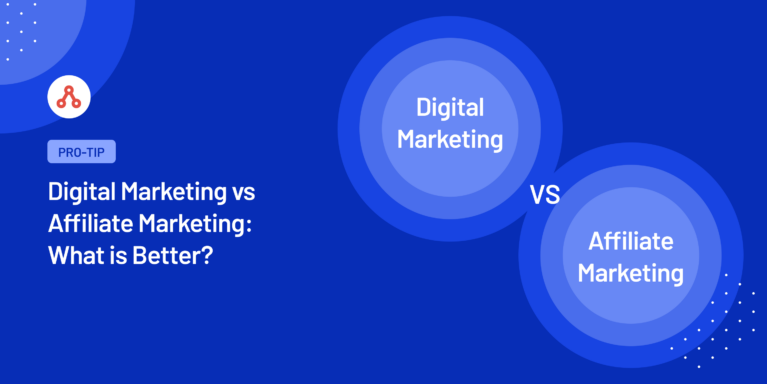
New in RewardsWP: Points, Redesigned Rewards Widget & More
RewardsWP now includes Points, a redesigned Rewards Widget, and new tools to launch, run, and measure loyalty and referrals in one place.
Continue Reading →
RewardsWP now includes Points, a redesigned Rewards Widget, and new tools to launch, run, and measure loyalty and referrals in one place.
Continue Reading →
Stuck trying to choose between digital marketing and affiliate marketing?
With so many people pushing both these methods online, it’s hard to know which path is actually worth your time and effort.
Maybe you’ve watched countless YouTube videos or read dozens of blog posts, but you’re still confused about which one could actually make you money.
In this article, I’ll explain digital marketing and affiliate marketing in detail, show you the real differences between them, and help you decide which one is right for you.
In This Guide
Digital marketing is how businesses promote their products or services online. Instead of billboards and TV commercials, digital marketing uses websites, social media, emails, and search engines to reach customers.

The reason why it’s popular is because people spend most of their time online these days.
That’s why the digital marketing industry is expected to hit $807 billion by 2026. Smart businesses are following their customers to where they are on their phones, laptops, and tablets.
Digital marketing works better than old-school marketing methods. For every $1 a business spends on digital marketing, they typically make $5 back.
That’s why 93% of marketers now use social media to promote their businesses. And if you’re wondering about emails, they’re not dead. Email marketing gives businesses $36 back for every dollar spent.
Content marketing (like blog posts and videos) is another powerful tool in digital marketing.
Companies that regularly post helpful content on their blogs get 67% more potential customers each month than those that don’t. Plus, it costs 62% less than traditional marketing while bringing in three times as many leads.
The beauty of digital marketing is that you can measure everything, from the number of people who clicked your ad to the number who opened your email.
This means businesses can see what’s working and what’s not, something that was much harder to do with traditional marketing.
You’ve probably heard about different types of digital marketing. Let me break them down in a way that makes sense with examples.
The 8 main types of digital marketing that successful businesses use today are:
Let’s discuss what’s good and bad about digital marketing.
I’ll break this down so you can understand exactly what you’re getting into.
Affiliate marketing is a performance-based marketing model in which individuals promote products or services and earn commissions for each successful sale made through their referrals.

The affiliate marketing industry is worth over $17 billion globally, growing by 10% annually.
Businesses are making $15 for every $1 they spend on affiliate marketing – a 1,400% return on investment. No wonder 81% of brands use affiliate programs to grow their sales.
But how does it work? There are three main players:
When someone becomes an affiliate, they get a special tracking link. When someone clicks that affiliate link and buys something, the merchant knows the sale came from the affiliate, and they earn a commission.
It’s that simple.
And this is the reason why businesses love it. They only pay when they make a sale.
There is no upfront advertising cost and no wasted budget, which is why companies like Amazon, Shopify, and thousands of others use affiliate marketing.
Here are the main types of affiliate marketing models that are actually working:
Like everything else, affiliate marketing has its advantages and disadvantages.
Some of the most common ones are:
By now, you have understood what digital and affiliate marketing are, their benefits and disadvantages, their types, and how they work.
So what’s the difference?
Digital marketing is an umbrella term for all online marketing efforts. It covers strategies like SEO, social media, content, email, and paid ads.
All are aimed at building brand awareness, driving traffic, and increasing sales.
Affiliate marketing is a specific part of digital marketing. Businesses partner with affiliates who promote their products in exchange for a commission. Affiliates only get paid when they generate a sale or lead.
This means digital marketing uses many approaches to reach audiences, while affiliate marketing focuses on third-party partnerships that are directly tied to results.
Digital marketing may need upfront investment, while affiliate marketing is lower-risk, paying only when results are achieved.
That’s the main difference between the two.
See, the answer really depends on your business goals and available resources.
Digital marketing gives you complete control over your brand’s message and how you reach customers. It’s ideal when you want to build a lasting brand presence and have the budget to invest in various marketing channels like SEO, social media, and paid ads.
While it requires more upfront investment and dedicated teams, it lets you build direct customer relationships and shape every aspect of your marketing strategy.
Affiliate marketing, on the other hand, is perfect if you want a performance-based approach where you only pay for results. Instead of spending money upfront on marketing campaigns, you leverage other people’s audiences and only pay when they drive sales or leads.
It’s the best choice if you have limited marketing resources and want to expand your reach quickly.
Pro Tip: Most successful businesses don’t choose one over the other, they use both.
Digital marketing builds your brand foundation, while affiliate marketing helps you reach new audiences and drive additional sales.
This often delivers the best results, especially when managed properly.
To grow your business cost-effectively with affiliate marketing, you need a robust and reliable tool to manage your affiliate program.
AffiliateWP stands out as the leading WordPress solution that makes running an affiliate program simple and efficient.
It integrates seamlessly with WordPress platforms like WooCommerce, Easy Digital Downloads, and MemberPress, so you can set up your affiliate program without technical hassle or coding skills.
This quick and easy integration gets your program running fast, right within your existing site.
What makes AffiliateWP particularly valuable is its comprehensive feature set. You get accurate tracking of all referrals and sales, customizable affiliate dashboards for your partners, and detailed reporting to monitor your program’s performance.
The 1-click payout system through Stripe or PayPal makes paying your affiliates quick and hassle-free.
On top of this, advanced features like affiliate coupon tracking, AI-powered affiliate review, multi-tier commissions, and the ability to create custom landing pages add extra value and scalability to your program.
AffiliateWP even comes with a 14-day money-back guarantee, giving you the confidence to try risk-free.
So why wait?
Start growing your business with AffiliateWP, the tool for reliable and efficient affiliate management.
Digital marketing is a broad approach that uses various online channels—such as SEO, social media, email, and content—to build brand awareness and drive engagement. Affiliate marketing, in contrast, is a specific performance-based strategy where affiliates promote a business’s products in exchange for a commission on each sale or lead.
Affiliate marketing can be more cost-effective for small businesses because it’s commission-based, meaning businesses only pay when affiliates generate actual results, like sales. Digital marketing, while powerful, often requires upfront investments in ads, content, or paid tools.
Businesses might choose affiliate marketing to expand their reach without high upfront costs and to leverage the affiliates’ trust and credibility with their audiences. This approach also allows businesses to pay only when they see measurable results.
Digital marketing is generally more effective for broad brand-building because it encompasses multiple channels that engage audiences directly. Affiliate marketing is better suited for driving specific actions, like sales, but can also support brand growth by reaching new audiences through affiliates.
If this article helped you, please follow us on Facebook and Twitter for more free affiliate marketing tutorials and guides.
Disclosure: Our content is reader-supported. This means if you click on some of our links, then we may earn a commission. We only recommend products that we believe will add value to our readers.
Launch your affiliate program today and unlock a new revenue channel to grow your business faster.
We use cookies to improve your experience on our site. By using our site, you consent to cookies.
Manage your cookie preferences below:
Essential cookies enable basic functions and are necessary for the proper function of the website.
Statistics cookies collect information anonymously. This information helps us understand how visitors use our website.
Marketing cookies are used to follow visitors to websites. The intention is to show ads that are relevant and engaging to the individual user.